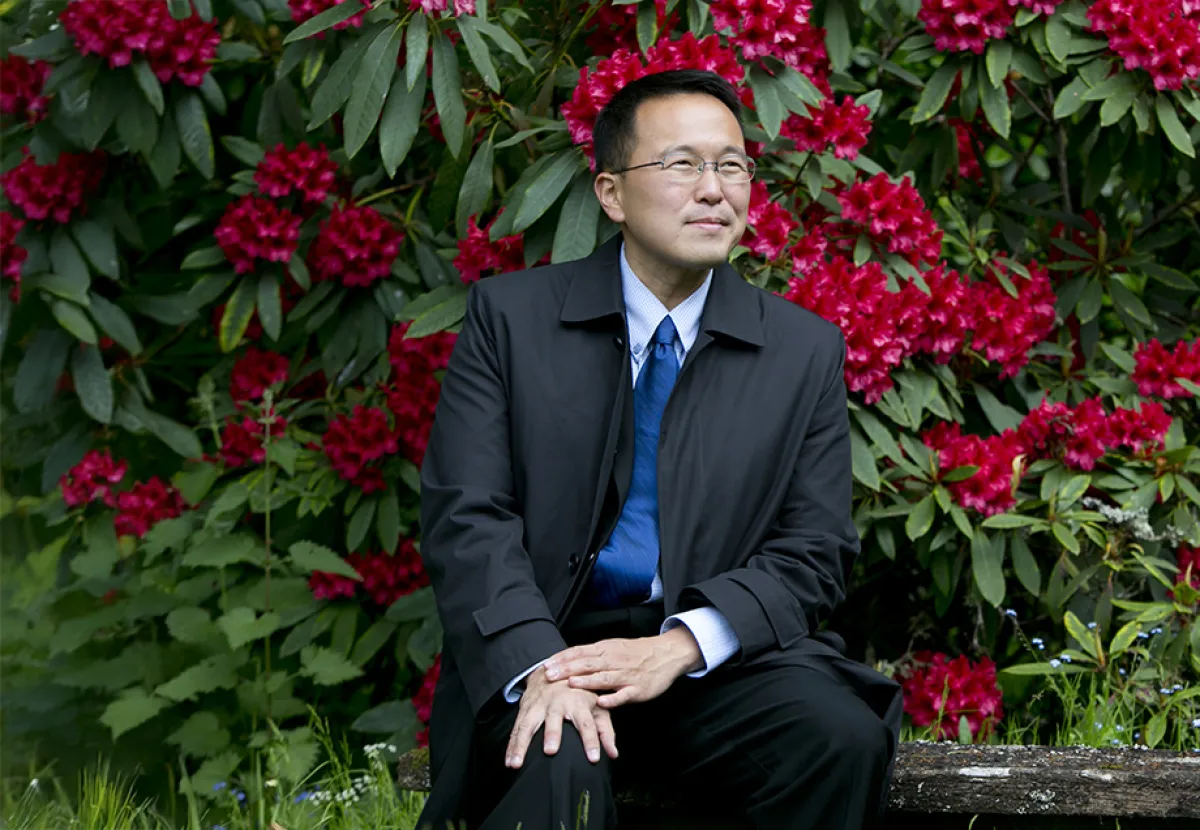How stories begin and the past takes on a new form

 Canongate
CanongateTan Twan Eng | The House of Doors | Canongate | 313 pages | 11,29 EUR
"To him, we were probably the most boring married couple he knew." When a character describes themself as boring right at the beginning of a novel, curiosity is aroused. You can't help but wonder why the author still finds them interesting enough to want to write about them. In the case of Lesley Hamlyn, the main character of Tan Twan Eng's third novel The House of Doors, this question arises twice.
In 1921, the Hamlyns received a visit from Europe: the writer William Somerset Maugham spent several weeks at the Hamlyns' house on the island of Penang on the west coast of Malaysia, then part of the British Empire. Maugham, an old friend of Lesley's husband Robert, was already a celebrated author at the time, and the Hamlyns enjoyed basking in his fame.
Tan Twan Eng's novel tells how Maugham becomes increasingly interested in Lesley's story during this three-week stay, eventually even incorporating it into one of his best-known stories, The Letter.
At first, however, Lesley is merely the younger wife of an old friend of the writer, a friendly but somewhat cold hostess. Also, Maugham is initially preoccupied with his own worries: First of all, there is his wife, who has stayed in London with their daughter. The marriage has long since broken down and Maugham seizes every opportunity to be away from London. He prefers to travel through South East Asia with his secretary and lover, Gerald. Only here can he live the way he wants in relative freedom; it would simply be impossible back at home. Since the trial of Oscar Wilde, the British public has had a word for same-sex love: homosexuality . But Wilde's conviction had only increased the fear of social exposure among his contemporaries. However, Maugham can only lead this life of freedom away from London as long as the money lasts. After a failed investment, this is his second major concern. He is therefore under great pressure to publish another book, and soon.
Tan Iwan Eng draws out the story of the gradual rapprochement between Maugham and Lesley Hamlyn. But the novel needs this steady -paced, calm narrative to give their rapprochement credibility. It ultimately succeeds because both characters suffer from similar constraints and social expectations despite their external trappings of comfort. On the surface, Lesley leads a life that is expected of a lawyer's wife: musical soirees, tennis, church choir, club memberships and charity work. Their sons are educated at English boarding schools and the many servants enable a comfortable life. Maugham soon realises that Lesley is different from the other women in British colonial society. She was born in Penang and is familiar with the culture, especially through her nanny, her amah Ah Peng. She speaks the local language, Hokkien, and can also communicate in Malay. She takes an active interest in the eventful history of Penang, an island that was under British administration in the early 20th century but was also a melting pot of different ethnic groups. For a time, Penang even served as the headquarters of the Chinese Tongmenghui, from where the revolution in imperial China was masterminded.
Lesley's seemingly modest statement at the beginning of the novel thus turns out to be part of a considered attitude. She sees through exactly how thin the line of female freedom is and how quickly a misstep can mean exclusion. She is a touching and clever character who must always exercise self-control and yet takes great risks in her attempt to give her own life meaning and purpose.
Tan Iwan Eng said in an interview in 2023 that he was particularly interested in gaps and empty spaces in stories. And his novel, which, like its predecessors, made it onto the longlist for the Booker Prize, is indeed about exploring such gaps. Somerset Maugham, for example, did spend a few weeks in Penang, the island where the author Tan Twan Eng comes from, on one of his many trips through Southeast Asia. However, Maugham never immortalised the island in literature, nor have any diary entries survived. This is where Tan Iwan Eng comes in: He fills in the gaps with his imagination and tells of a long lost world, of silence and concealment, but also of the desire for self-determination.
In doing so, he very subtly manages to portray the colonial world in such a way that it shows the perspective of contemporaries, but at the same time creates distance from it. For example, he describes an excursion that Maugham and his host made to the summit of Penang Hill, which rises above the city of Penang. Then, in 1921, the only means of reaching the summit was by foot: the funicular, which still exists today, opened three years later in 1924. However, the two men do not have to make the arduous ascent themselves. Instead, each are carried up in a dhooly, a wicker chair with two bamboo poles attached, requiring four local men apiece. Once at the summit, however, we only witness the perspective of the two Europeans ( once 'recovered' from the strenuous swinging of their chairs). The huge effort of the eight men toiling to the summit, they neither notice nor appreciate. With scenes like this, Tan Twan Eng provides glimpses of colonial reality without directly denouncing it. He shows the naturalness and blindness of British dominance, which hardly questions itself. It is precisely this restraint that constitutes the novel's narrative achievement.
The House of Doors takes settings, characters and stories from Maugham's work, and like a mirror, reflects them, whilst also subtly shifting the gaze and allowing new facets to shine through. You are left with a real desire to rediscover or re-read Maugham's stories and novels.
Did you enjoy this text? If so, please support our work by making a one-off donation via PayPal, or by taking out a monthly or annual subscription.
Want to make sure you never miss an article from Literatur.Review again? Sign up for our newsletter here.



